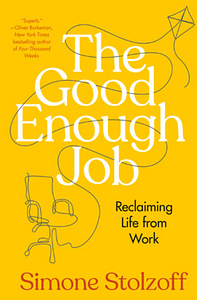Take a photo of a barcode or cover
An excellent book for anyone looking to develop a healthier relationship with work.
I loved this book. Stolzoff's writing style is fresh and engaging, and the choice to structure the text as a series of profiles based on common work myths (primarily in US American work life) is particularly effective.
I also appreciate the "take-aways" at the end and the recurring emphasis on the fact that choices about work are largely constrained by systemic factors-- and what changes to those systems might look like. That said, I'm going to take his advice aimed at the individual and start asking people what they like to do.
I also appreciate the "take-aways" at the end and the recurring emphasis on the fact that choices about work are largely constrained by systemic factors-- and what changes to those systems might look like. That said, I'm going to take his advice aimed at the individual and start asking people what they like to do.
Really enjoyed this perspective on work and careers. Some of the stories are uncomfortable to read at times, because they so closely mimic awful work habits or expectations in my own past, and I'm sure I'm not the only one.
Definitely recommend for those of you who are feeling antsy in your career and are maybe tired of climbing the corporate ladder for the sake of climbing.
Definitely recommend for those of you who are feeling antsy in your career and are maybe tired of climbing the corporate ladder for the sake of climbing.
A smattering of thoughts I’ve read and heard and thought through the years. This might be mindblowing to a corporate ladder stooge, but to someone who’s chosen for years to prioritize family over work, it’s just a lot of stating some fairly obvious points coming from a privileged but talented writer.
The author should not have read the audio book. Very monotone, kind of congested sounding? I couldn't finish it but it's only for this reason. Hire voice actors, people.
informative
reflective
fast-paced
Easy read, 3.5 stars. This book has a specific audience, the white collar professional class, for whom the messages of workism will resonate loudly. At least it did for me. While I found myself nodding along to some parts of the book, I also feel like I might forget a lot of it?
I'm entirely unsurprised that burnt-out public librarians make an appearance in this book. Not only is there a whole issue with vocational awe, but most of them are doing jobs beyond what they're qualified for (security, building maintenance, and social work among them). I like a good amount of what this book has to say, especially as it pertains to millennials in public service. Boundaries in professional life aren't bad.
informative
“On the other side of deprioritizing work is prioritizing life… what can you do to remind yourself that you exist on this earth to do more than produce economic value?”




